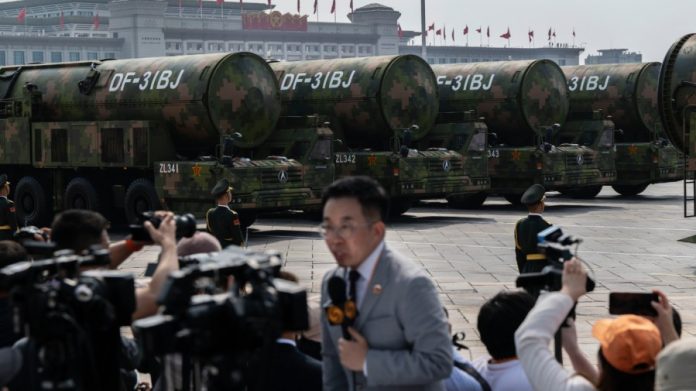
On Aug. 27, Beijing rejected out-of-hand President Trump’s call for denuclearization talks with China and Russia.
It’s not hard to figure out why China is in no mood to talk about the world’s most destructive weapons. Alone among the major powers, Beijing is fast increasing its stockpile of them.
“I think the denuclearization is a very — it’s a big aim,” Trump told reporters at the White House. “But Russia’s willing to do it, and I think China is going to be willing to do it too.”
“We can’t let nuclear weapons proliferate,” he added. “We have to stop nuclear weapons. The power is too great.”
It’s not clear what Trump meant by “denuclearization” — complete disarmament or merely a reduction in the number of weapons — but his comments indicate he is following in the footsteps of Ronald Reagan, who wanted to completely abolish nukes.
Tulsi Gabbard, Trump’s director of national intelligence, also favors disarmament, as her comments in a three-minute video posted in early June suggest.
Denuclearization might have crossed Trump’s mind now because America’s last nuclear arms-control agreement with Russia will expire soon.
New START, which limits the number of warheads each side may deploy, came into force in 2011 and was extended in 2021. It is scheduled to terminate in February.
Termination may not have much of a practical impact, however. Moscow, after all, is violating New START’s terms by not permitting regular inspections. In February 2023, Vladimir Putin announced he was suspending participation in the treaty.
Getting Russia to the negotiating table may or may not be an easy lift, but enticing the Chinese to talk will certainly be much more difficult.
“It is neither reasonable nor realistic to ask China to join the nuclear disarmament negotiations with the U.S. and Russia,” said Chinese Foreign Ministry spokesperson Guo Jiakun at his regular press briefing.
“The country sitting on the world’s biggest nuclear arsenal,” Guo said, is primarily responsible for disarmament and should take actions including “drastic and substantive cuts to its nuclear arsenal” and “[creating] conditions” for global nuclear disarmament.
Guo was likely referring to the U.S., but Russia, in fact, maintains the world’s largest arsenal of nuclear weapons.
The Stockholm International Peace Research Institute estimates that last year Russia maintained 4,380 deployed weapons. The U.S., the institute believes, possessed 3,708 warheads while China had 500, up from 410 in 2023.
China has never publicly confirmed it number of nukes, and there is no consensus as to the current size of its arsenal. Almost all observers, however, agree that it is building warheads fast. The Pentagon in a November 2022 report forecast that China would quadruple warheads from about 400 to 1,500 by 2035.
Nuclear analyst James Howe predicts China will have between 3,390 to 3,740 weapons by 2035.
Richard Fisher of the International Assessment and Strategy Center looks at the rapid increase in delivery platforms, such as missiles and subs, and thinks China will have even more. He told me his 2035 estimate: 7,000.
“I don’t think I’ve seen anything more disturbing in my career than the Chinese ongoing expansion of their nuclear force,” said Frank Kendall when he was secretary of the Air Force in House testimony in March 2023.
Adm. Charles Richard, as commander of U.S. Strategic Command in 2021, said: “We are witnessing a strategic breakout by China.”
“For decades, they were quite comfortable with an arsenal of a few hundred nuclear weapons, which was fairly clearly a second-strike capability to act as a deterrent,” Kendall testified, referring to China.
“That expansion that they’re undertaking puts us into a new world that we’ve never lived in before, where you have three powers — three great powers, essentially — with large arsenals of nuclear weapons.”
With its rapid buildup, China is apparently looking for a war-fighting capability. Its increased nuclear weapons capacity means its threats to launch first strikes would be credible and Beijing would thus be able to intimidate adversaries into not defending, say, Taiwan.
“The breakneck growth in China’s nuclear weapons tells us Xi and his [Chinese Communist Party] comrades see nuclear weapons as instruments of coercion and terror to use in furthering China’s hegemonic ambitions,” Peter Huessy of the National Institute for Deterrence Studies told me this month.
China’s rejection of negotiations could also be a sign of weakness.
“The [Chinese Communist Party] pushback on denuclearization talks could be easily misread as Chinese assertiveness or Xi Jinping’s ‘Wolf Warrior’ diplomacy,” Blaine Holt, retired Air Force general and military analyst, wrote to me after the Chinese foreign ministry statement.
“In actuality, avoiding the topic altogether and shunning dialogue betrays a Communist Party and People’s Liberation Army mired in crisis. No one in Beijing feels they can discuss this.”
Whether China is weak or strong — that debate continues — the Chinese leadership has decided it will not talk nukes with the United States.
During the Cold War, the U.S. did not have to consider China’s arsenal when negotiating arms control with the Soviet Union. Now, in light of the rapid buildup in China, the U.S. cannot prudently come to any agreement with Russia about nuclear weapons if the Chinese are not a party.
Beijing has essentially taken both disarmament and arms control off the table.
Gordon G. Chang is the author of “Plan Red: China’s Project to Destroy America” and “The Coming Collapse of China.”

